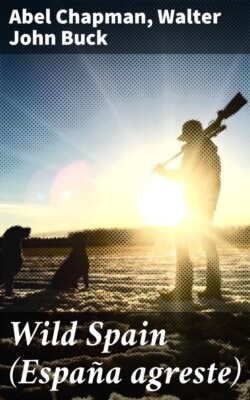Читать книгу Wild Spain (España agreste) - Abel Chapman - Страница 13
На сайте Литреса книга снята с продажи.
II.—Santo Domingo. An Idyl.
ОглавлениеTable of Contents
The chimes of San Miguel were already ringing out the summons to even-song. Graceful figures in dark lace and mantillas hurried across the palm-shaded Plaza, as two Ingléses (sus servidores de ustedes) rode out of the city on an April afternoon.
It was rather for a ride than with any special sporting object in view that we set out. Yet, as is always the case in Spain, the guns were slung behind the saddle, and we remembered that, only a few days before, one of us had encountered a band of thirteen bustards—a dozen of which should still be basking on the green corn-lands of Santo Domingo, within a league of the octroi boundary.
The binoculars, however, swept the swelling grounds without disclosing any occupants more important than a group of grey cranes and a pair of partridges indulging in vernal flirtations, careless of a kite which hovered hard by.
THE BUSTARD-SHOOTER—TRIUMPH!
Beyond the corn-land lay undulated manchones, or fallows, clothed with a short growth of grass and thistles, and here on the summit of a flat-crowned knoll, a mile away, we descried a band of eight bustards. Hardly could a more unfavourable spot be selected. Their sentries commanded every visible approach, and we advanced in Indian file to reconnoitre, with the conviction that any operation must be in the nature of a forlorn hope. But a skill and rapid perception of the least advantage, worthy of a field-marshal, were at work, directed against the hapless eight. Riding circuitously around the game, we had approached as near as prudence allowed—some 300 yards, when an almost imperceptible depression served for a few moments to screen us from their view. Hardly had the last head sunk below the sky-line than one of the two guns rolled out of the saddle, passing the reins to his companion, who, in ten more yards, had reappeared to the already suspicious bustards. By the invaluable aid of a tiny furrow, worn by the winter's rains, but barely a foot in depth, No. 1 managed to worm a serpentine progression to the shoulder of the hill—a point some 100 yards up the gentle slope, and barely twice that distance from the game—while No. 2, slowly encircling the birds at 200 yards radius, gradually contracting and in full view, gained the reverse of the hill. Twice the big sentry had given the warning to "be ready"; as often the hunter widened his course till suspicion was allayed. Critical moments these, when success or failure depend upon a thread: upon instant diagnosis of what is passing in one's opponent's mind, divining, so to speak, his intentions before he has actually perfected them, or even decided himself.
So perfect in this encounter was the strategy—so complete the ascendency of mind over instinct—and the keenest instinct of all, that of self-preservation—that in due time the intervening space had been diminished, yard by yard, almost to the fatal range. Presently the still hesitating birds are little more than one hundred yards away—the great sentinel some five yards nearer. Now: mark well every movement of his—there is the signal at last: his stately head is lowered—slowly lowered some six inches while he still watches intently. Now he takes a rapid step forward—he is going. But hardly have the huge wings unfolded than the rider has sprung to his feet, and a couple of charges of "treble A" crash together into that broad back and lowered neck. The distance is great—near 100 yards—but mould-shot and cold-drawn steel barrels have done it before, and will do it again: back to earth, which he had barely quitted, returns the stricken monarch of the plain, blood staining his snowy breast, and one great pinion hanging useless by his side.
Plate X. ANCIENT DRAW-WELL ON THE PLAINS. Page 52.
The seven survivors wing away straight towards the point where the other gun lies hidden in the dry drain-head. Mark! Now the leading barbon checks his flight as he sees the flash of barrels beneath: but it is all too late, and down he, too, comes with a mighty crash, to earth. A third, offering only a "stern shot," continues a laboured flight, his pinion-feathers sticking out at sixes and sevens, and soon pitches on the verge of a marshy hollow where storks are dotted about in search of frogs. It was an awkward place, and necessitated moving him again: indeed, this bird gave no small trouble to secure. The sun had already set, and night drew on apace, ere the final shot, ringing out amidst gathering gloom, told that he, too, had been added to the spoils of that glorious afternoon.
